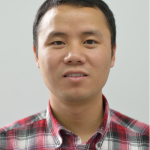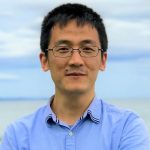
Prof. Bin Zhang
Dr. Bin Zhang is a Professor at the Department of Genetics and Genomic Sciences and the Director of the Mount Sinai Center for Transformative Disease Modeling at the Icahn School of Medicine at Mount Sinai. His expertise lies in machine learning, pattern recognition, bioinformatics, systems biology and with applications to disease modeling and drug discovery. Prior to his appointment at Mount Sinai, he was a Principal Scientist and Group Leader of Sage Bionetworks, a non-profit research organization started in 2009 that grew out of a decade of intense well-funded work at Rosetta Inpharmatics, a wholly owned subsidiary of Merck & Co. Before he joined Sage, he worked at Merck & Co. first as a senior research scientist from and then as a Research Fellow. Prior to joining Merck & Co., he was a post-doctoral fellow and then a Research Faculty and Senior Biostatistician at David Geffen Medical School of University of California at Los Angeles. He holds a Ph.D. and a master degree in Computer Science from the State University of New York at Buffalo, a master degree in electronic engineering from Tsinghua University, Beijing, China, and a bachelor’s degree in electrical engineering from Tongji University, Shanghai, China.

Dr. Lap Ho
Dr. Lap Ho is an Associate Professor at the Department of Genetics and Genomic Sciences at the Icahn School of Medicine at Mount Sinai. He is experienced in translational preclinical and clinical neuroscience research. His work has generated insights on the molecular mechanisms underlying the onset and progression of Alzheimer’s disease (AD) and other neurological disorders, and translated this information into multiple therapeutic developments. His current research focuses on the development and implementation of diverse in vitro and in vivo experimental models to validate functions of key molecular drivers of novel molecular pathways underlying AD and other neurodegenerative disorders and to develop potentially therapeutically useful lead compounds targeting the validated drivers.

Dr. Christian Forst
Dr. Christian Forst is an Assistant Professor in the Genetics and Genomic Sciences at the Icahn School of Medicine at Mount Sinai. He received his Ph.D. in Theoretical Chemistry from the University of Vienna, Austria. He holds a B.S. in Astronomy from the same University. Early in his academic career he made valuable contributions to research in systems biology and biomolecular networks. For example, he unified different dynamic systems relevant in molecular evolution and game theory with complex and chaotic behavior. Currently, he is employing multi-scale network approaches to identify host-pathogen interactions.

Dr. Minghui Wang
Dr. Minghui Wang is an Assistant Professor in the Genetics and Genomic Sciences at the Icahn School of Medicine at Mount Sinai. He was trained in statistical and quantitative genetics with Dr. Zewei Luo during his graduate studies at Fudan University and postdoctoral research at the University of Birmingham. By combining statistical modeling and biological systems network analyses, Dr. Wang devised novel likelihood-based methods for estimating disease and marker loci association in non-random samples or case-control cohorts and developed a new framework for gene- and pathway-based analyses of patients’ genotypes with clinical traits. Currently, he is developing predictive network models to integrate multi-Omics data in neurodegenerative disorders such as Alzheimer’s disease and Parkinson’s disease.

Dr. Won-min SOng
Dr. Won-Min Song is an Assistant Professor in the Genetics and Genomic Sciences at the Icahn School of Medicine at Mount Sinai. He received his PhD and BS degrees in physics from Australian National University. He did his postdoc training in systems biology with Prof. Bin Zhang. His research is focused on developing novel network inference and analysis algorithms to integrate multi-Omics data in complex diseases such as cancer, asthma, inflammatory bowel disease (IBD) and neurodegenerative diseases. The ultimate goal of his research is to maximize the capability of big data and machine learning in medicine to advance personalized medicine.

Dr. Qian Wang
Dr. Qian Wang is a senior scientist with joint expertise in computational and experimental biology. She earned her PhD in Biomedical Sciences from Icahn School of Medicine at Mount Sinai, focusing on the molecular mechanisms that regulate the homeostasis of the hypothalamus-pituitary-gonad axis. She finished her postdoctoral training in computational systems biology with Dr. Bin Zhang, with specific focus on the neurodegenerative diseases such as Parkinson’s disease (PD). By applying a multiscale network approach to an ensemble of molecular profiling data from the postmortem brains of PD patients, she identified gene co-expression modules that are able to capture cell-type specific and disease-relevant features and prioritize key regulators of disease pathogenesis and progression. She subsequently validated one of the top key regulators using in vitro and in vivo model systems where perturbation of this gene can cause PD-like behavioral and pathological phenotypes. She aims to not only reveal the gene regulatory landscape in the PD brains but also shed light on novel targets for PD therapeutics.

DR. Erming Wang
Dr. Erming Wang is a senior scientist in computational biology. He received his PhD degree in Genetics from Chinese Academy of Sciences. He started his career in quantitative genetics and statistics, throughout years. He worked on genomics and functional genomics of various biological and medical systems and in recent years has focused on utilizing bioinformatics and system biology tools to unravel molecular mechanisms of human diseases. Dr. Wang has published twenty first author original research papers in journals such as Nature Biotechnology, Nucleic Acids Research, Experimental Neurology and Journal of Alzheimer’s Disease. As either PI or coPI, Dr. Wang received support of eight research grants, and was co-inventor of a US patent.

Dr. Aiqun Li
Dr. Aiqun Li is a Senior Scientist at the Department of Genetics and Genomic Sciences. He joined the Zhang & Brennand Labs in October 2017. He is working on the validation of novel targets for Alzhelmer’s disease (AD) using stem cell technologies, CRISPR gene editing systems and next-generation genome sequencing. He earned his B.S. and M.S. in Medicine from Nanjing Medical University in 2000 and 2003, respectively. He then received his Ph.D. in Biochemistry and Molecular Biology from the Chinese Academy of Sciences in 2006. He conducted his postdoctoral training at Weill Cornell Medicine during 2007-2011. Dr. Li joined NYSCF as a Staff Scientist for the NYSCF-Golub Stem Cell Research Initiative for Parkinson’s Disease in 2011, and served as a NYSCF Investigator since 2016. He was the recipient of the P&G Award for Outstanding Graduate Student, the Shanghai-Unilever Research & Development Fund, the Bachmann-Strauss Dystonia & Parkinson’s Foundation Research Grant, the Parkinson’s Disease Foundation Lucien Côté Early Investigator Award, the New York Community Trust Grant, NIH/R21 subaward, and the MJFF Award. In his spare time, he loves playing sports.

Dr. Xianxiao Zhou
Dr. Xianxiao Zhou is a Senior Scientist in network biology and drug discovery. He obtained his BS in Biotechnology and PhD in Bioinformatics and Cancer systems Biology, both from University of Electronic Science and Technology of China. His current research is focused on identification of drugs and drug combinations for complex human diseases such as cancer and neurodegenerative diseases.

Scot Laney
Scot Laney is an Administrator and a Grants Specialist. He received his M.B.A in Marketing from Fordham University Graduate School of Business. His work has focused on academic administration, grants management, and research management.

Dr. Emrin Horgusluoglu-Moloch
Dr. Emrin Horgusluoglu-Moloch is an NIH granted postdoctoral fellow in genetics of brain imaging of Alzheimer’s disease (AD). During her PhD training, she had gained extensive experience in two major sub-disciplines of neuroimaging and genetics in Indiana University, School of Medicine. She have devoted much of her career to biomarker development with an emphasis on advanced informatics strategies for integration of imaging, medical, and bio-informatics. Her current research aims to identify key biological drivers and pathways that impair white matter microstructural integrity and connectivity between AD-related brain regions which has potential for discovery of novel therapeutic targets for AD.

Dr. Lei Guo
Dr. Lei Guo is a Postdoctoral Fellow in systems biology of ageing and Alzheimer’s disease. He received his Ph.D. degree in Biology from the University of North Dakota. He is studying Alzheimer’s disease (AD) pathogenesis with a special focus on sex differences in AD and ageing. He employs state-of-the-art systems biology approaches to identify sex-specific key molecular networks and drivers of AD and aging.

Dr. Chen Ming
Dr. Chen Ming is a Postdoctoral Fellow in Genetics of Alzheimer’s disease. She received her BS in Natural Science from the University of Science and Technology of China and PhD in Bioinformatics from the CAS-MPG Partner Institute for Computational Biology. Currently, she is working on identification and functional characterization of copy number variations in Alzheimer’s disease.

Dr. Sezen Vatansever
Dr. Sezen Vatansever is a Postdoctoral Fellow in drug discovery. She is a physician-scientist, having earned her M.D. from Ankara University School of Medicine, Turkey, and her Ph.D. in Biomedical Sciences and Engineering from Koc University Graduate School of Sciences and Engineering, Turkey. Her graduate studies focused on computer-aided drug discovery approaches for treatment of infectious diseases and cancer. Currently, she is identifying novel drug targets for Alzheimer’s disease and translating them into new, small molecule drug therapies using Artificial Intelligence and other advanced bioinformatics methods. In her free time she supports Alzheimer’s Association by running.

Dr. Peng Xu
Dr. Peng Xu is a Postdoctoral Fellow in systems biology of cancer and diabetes. He obtained his Ph.D. from the University of Chinese Academy of Sciences in 2016. His previous research experience includes genomic landscape analysis of obese cancer patients and bioinformatics tool development with different sequencing platforms. He joined the Icahn School of Medicine at Mount Sinai in Oct 2019. His current interest is to identify genomic variants and regulatory networks in diabetes and cancers. Travelling and photography are his hobbies.

Dr. Qi Shen
Dr. Qi Shen is a Postdoctoral Fellow in deep learning and 3D brain image processing. She earned her PhD in Biostatistics from the Fudan University, Shanghai. Before she joined this lab, she was an associate professor at the School of Mathematics, Sun Yat-sen University, Guangzhou, China. She has extensive experience in statistical modeling of high-dimensional omics data and machine learning methodology. She is developing novel machine learning and pattern classification algorithms on large, heterogeneous biological data in Alzheimer’s disease and Parkinson’s disease.

Dr. Sujeethraj Koppolu
Dr. Sujeethraj Koppolu is a Postdoctoral Fellow in machine learning and microRNA-target prediction. He earned his B.E. in Biomedical Engineering in 2009 from Osmania University in Hyderabad, India. He completed his M.S. in Biomedical Engineering from Polytechnic Institute of NYU in 2012. During his master’s study, he worked as an intern at Riverside Research in New York City, where he studied the influence of shell properties on high-frequency ultrasound imaging using microbubble contrast agents. Later, he joined the lab of Dr. Lara K. Mahal at New York University to study glycosylation using bioinformatic methods. His work was crucial in establishing microRNAs as one of the major regulators of the glycome. This work led to miRNA-proxy hypothesis through which previously unknown functions of glycosylation genes using the relatively well-studied microRNAs. Upon receiving his Ph.D. in 2017, Sujeeth joined the Multiscale Network Modeling Laboratory (MNML) headed by Dr. Bin Zhang at Icahn School of Medicine at Mount Sinai in February 2018, to develop advanced machine learning strategies to improve the in-silico target prediction accuracy of microRNAs.

Ryan Neff
Ryan Neff is an MD/PhD student in the Zhang Lab. Ryan graduated with a Bachelor of Science in Biomedical Engineering in 2013 from Harvard College, where he developed a new tool for cardiac catheters and a wearable soft robotic device for stroke patients. His research is focused on identification and characterization of molecular subtypes in Alzheimer’s disease. Ryan has many hobbies and likes to ride bikes around New York City, solve puzzles and escape rooms, mess with electronics and radios, and spend time with close friends and family.

Julia Zhao
Julia Zhao is a PhD student co-mentored by Dr. Bin Zhang and Dr. Ernesto Guccione. Her research is focusing on characterizing liver cancer subtypes through the angle of alternative splicing/promoters, and validating predicted key drivers and druggable targets via epigenetic inhibitors. Prior to Mount Sinai, Julia has worked on neoantigen immunotherapy in pancreatic cancer at Memorial Sloan Kettering Cancer Center and explored possible methods in predicting gene functions via tissue specific gene enrichment analysis. Julia has a Bachelor degree in Neuroscience and Masters in Microbiology & Immunology from Johns Hopkins University.

Qi Zeng
Qi Zeng is a PhD student mentored by Dr. Bin Zhang. Her research mainly focuses on the application of deep learning techniques for classifying Alzheimer’s disease (AD) from Mild Cognitive impairment (MCI) and Normal subjects (NL) through the utilization of multimodality approaches that integrate neuroimaging, genetic and medical information, which also helps reveal the biomarkers that identify the classification and the transition of the disease. She holds a master degree in Neuroscience from Columbia University, where she gained extensive experience in analyzing neuroimaging across aging population and Alzheimer’s patients.

Helena Belloff
Helena Belloff is currently a Masters student in the Biomedical Data Science program at the Icahn School of Medicine at Mount Sinai. She graduated with a Bachelor degree in Mathematics and Statistics from Columbia University in 2018 and started her career as a Data Scientist in the Global Drug Safety and Risk Management department at Celgene Corporation. She is excited by big data and machine learning and its applications in Alzheimer’s Disease.

Alexander Stone
Alexander Stone is a recent graduate from Cornell University, where he earned his Bachelor’s in Bioengineering and Master’s of Engineering in Biomedical Engineering. As a student he worked in a structural biology lab, assisting in recombinant protein production. Currently he is working as an Associate Researcher in the labs of Drs. Daniel Wacker and Bin Zhang. He is interested in contributing to the discovery/development of novel therapeutics for Alzheimer’s. In his spare time, he enjoys running, hiking and spending time with his family.

Judson Ellis
Judson Ellis Judson Ellis is a research associate in the Zhang Lab and recent graduate of Brown University. He is experienced in genetics and immunological research. His current research focuses on the effects of certain driver genes on AD pathophysiology, and the testing of drugs to target those genes.
